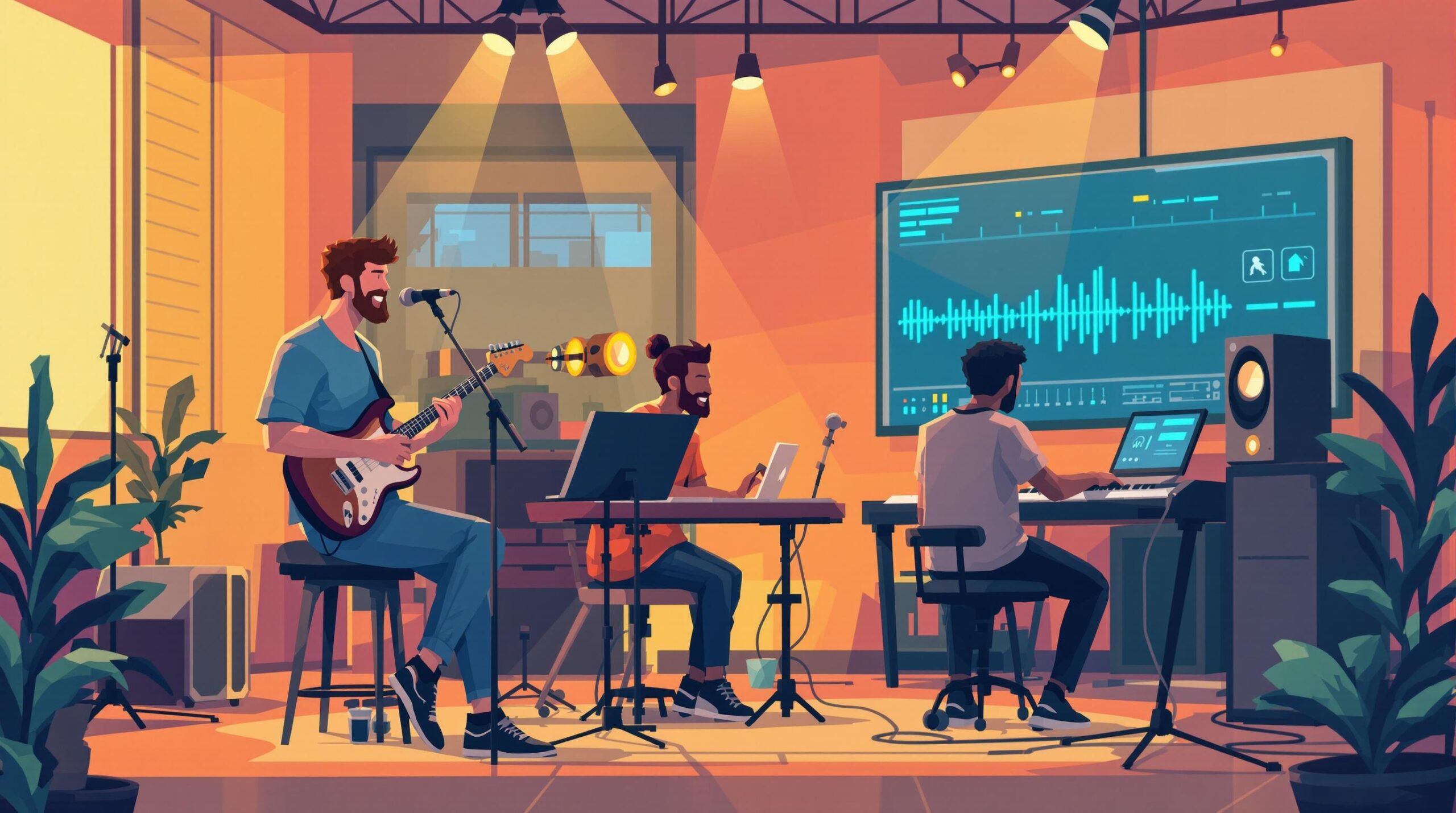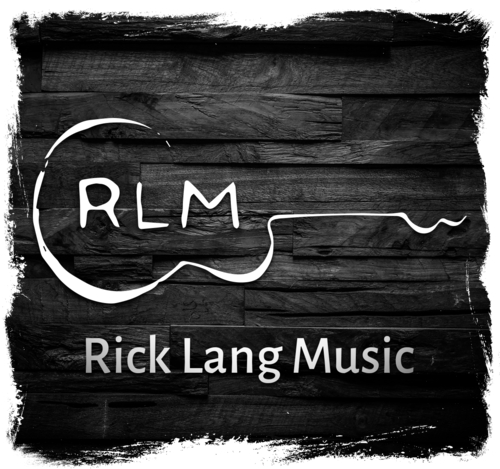AI tools are transforming songwriting by assisting with lyrics, melodies, and market analysis. They help musicians overcome creative blocks, refine compositions, and predict trends. Here’s a quick overview of how AI is shaping music creation:
- Lyrics Generators: Tools like WriteMe.ai and Suno AI create genre-specific lyrics and spark ideas.
- Melody Creation: Platforms like MuseNet and Suno AI suggest melodies tailored to your style.
- Market Analysis: AI studies trends and audience preferences to guide songwriters.
- Song Structure Tools: Tools like Amper Music suggest better arrangements and transitions.
- AI Co-Writing: AI acts as a creative partner, offering real-time suggestions for lyrics and melodies.
AI doesn’t replace creativity – it enhances it, making songwriting more intuitive and data-driven. Whether you’re a professional or a beginner, these tools can elevate your music process.
Grammy-winning producer Timbaland transforms his new single with Suno
1. AI Lyrics Generator Tools
AI lyrics generators are changing the way songwriters approach their craft, helping them tackle writer’s block and spark new ideas. These tools analyze massive song libraries to create lyrics that fit specific genres, moods, and themes. Platforms like WriteMe.ai highlight how AI is reshaping the songwriting process.
WriteMe.ai lets you steer the creative process by selecting a theme, style, and tone. For instance, if you want an "upbeat pop love song", it generates lyrics tailored to that vibe.
Suno AI takes it a step further by combining lyric creation with melody suggestions. It evaluates the emotional tone of your lyrics and proposes musical elements that complement them, offering a more integrated songwriting experience.
Here’s how professional songwriters are using these tools:
- Developing Themes: Enter key ideas to craft verses that align with your concept.
- Matching Styles: Define genre-specific parameters to ensure the lyrics follow established norms.
- Collaborating Creatively: Use AI-generated content as a springboard to refine and build on your ideas.
A great example of AI-assisted songwriting is Benoit Carré’s track "Hello World," created with Flow Machines technology. It showcases how AI can be a valuable partner in the creative process.
Think of AI lyrics generators as collaborators. Start with a clear vision, provide specific keywords or emotions, and let the AI broaden your ideas – all while keeping your personal style at the forefront.
2. Melody Creation with AI
After AI’s involvement in lyric writing, melody generators take things a step further by offering intelligent musical foundations. Tools like Musicfy’s melody generator and OpenAI’s MuseNet analyze massive music databases and use deep learning to create melodies tailored to specific genres and styles.
Here’s a look at how modern AI melody tools enhance music creation:
| Feature | What It Does | How It Helps |
|---|---|---|
| Pattern Analysis | Detects effective melodic structures | Suggests fitting chord progressions |
| Genre Blending | Mixes elements from various styles | Produces cross-genre compositions |
| Real-time Adaptation | Adjusts instantly based on user input | Allows fast experimentation |
These tools help composers quickly explore ideas and refine their sound. Platforms like Suno AI even offer free plans, making these tools more accessible. However, their real benefit lies in how they work alongside human creativity.
To get the most out of AI melody generators, treat them as collaborators. Start with specific inputs – like preferred chord progressions or a desired style – and use the generated melodies as a foundation. This way, you remain in control while using AI to spark ideas and overcome creative roadblocks.
Whether you’re creating catchy pop tunes or intricate jazz harmonies, AI tools can adapt to a wide range of musical styles. For jazz musicians, for example, these tools can analyze complex harmonies and suggest melodic lines that fit seamlessly, helping artists explore new ideas while staying true to their genre.
3. Music Market Analysis Tools
AI-driven tools are changing the way songwriters understand trends and audience preferences by analyzing music data and performance metrics.
Spotify’s "Taste Profile" is a great example. It uses AI to study user behavior and create personalized playlists, predicting which tracks will resonate best with listeners.
Here’s how these tools are helping songwriters:
| Feature | Application | Impact |
|---|---|---|
| Real-time Trend Analysis | Tracks current listening patterns | Aligns compositions with what the market wants |
| Sentiment Analysis | Measures the emotional tone of lyrics | Helps refine tone and messaging |
| Cross-genre Analytics | Spotlights successful elements across styles | Encourages blending of styles for new ideas |
These tools combine creativity with data, helping songwriters make informed decisions without sacrificing their artistic vision. For instance, Billboard uses AI scoring systems to predict a track’s market potential based on detailed metrics.
Real-time data has also changed how artists adapt to market trends. Platforms like Promoly let musicians and labels track audience engagement as it happens, offering immediate feedback.
sbb-itb-1c6af30
4. Smart Song Structure Tools
AI-powered tools are changing the way songwriters approach structure by analyzing successful tracks and offering data-driven suggestions for improving compositions. Let’s take a closer look at some of the platforms leading this shift.
Platforms like Amper Music and AIVA go beyond basic arrangement advice, diving deep into essential elements such as:
| Feature | Purpose | How It Helps |
|---|---|---|
| Chord Progression Analysis | Examines harmonic patterns in hit songs | Helps craft more appealing melodies |
| Arrangement Detection | Maps common song structures | Fine-tunes verse-chorus flow |
| Bridge Placement | Pinpoints effective transition points | Smooths out song dynamics |
| Outro Development | Suggests impactful endings | Leaves a lasting impression |
AI is no longer just about generating melodies or lyrics – it’s stepping into the realm of song structure. Suno AI, for example, analyzes tracks and offers suggestions tailored to specific genres and current trends, making it a standout choice for many songwriters.
These tools also integrate with DAWs, offering real-time feedback during collaborative sessions. Their biggest strength? They help writers uncover successful patterns in their genre while ensuring the music stays authentic to their style.
For example, AI can analyze popular songs in a particular genre to suggest better arrangements or smoother transitions. This keeps listeners engaged without compromising the artist’s creative vision.
They’re especially useful for overcoming creative blocks. By offering alternative structures and arrangement ideas, these tools open up new possibilities for songwriters, helping them explore fresh directions while maintaining professional standards.
5. AI Co-Writing Tools
AI co-writing tools, like Suno AI, have become powerful partners for songwriters, helping to enhance creativity and efficiency. These tools go beyond just assisting with lyrics and melodies – they offer comprehensive support throughout the creative process, from analyzing market trends to structuring compositions.
Here’s a look at some of the standout features these tools bring to the table:
| Feature | Purpose | How It Helps |
|---|---|---|
| Real-time Suggestions | Creates melodies and lyrics on the spot | Speeds up creative decisions |
| Genre-specific Analysis | Examines style patterns in different genres | Ensures alignment with the chosen genre |
| Sentiment Matching | Matches musical elements with lyrical emotions | Builds stronger emotional connections |
| Cross-genre Innovation | Combines elements from various styles | Opens doors to unique genre blends |
These capabilities provide practical, hands-on assistance during songwriting sessions.
Platforms like OpenAI’s MuseNet and Google’s Magenta have redefined the co-writing process. By drawing insights from massive music databases, they act as virtual collaborators, offering suggestions that complement the songwriter’s vision.
Songwriters are weaving these tools into their workflows to simplify collaboration. Whether it’s refining chord progressions, suggesting alternative melodies, or brainstorming lyrics, these tools deliver instant input without disrupting the creative rhythm.
One of their biggest strengths? Helping creators push through mental blocks. By offering fresh ideas or new directions based on initial concepts, these tools inspire without overshadowing the songwriter’s personal style.
Conclusion
AI has reshaped the way musicians approach songwriting, offering tools like Suno AI and platforms such as Spotify’s Taste Profile. These advancements have made music creation easier to access while keeping the core of human creativity intact.
From overcoming writer’s block to predicting market trends and refining song structures, AI has become a helpful companion in the creative process. Tools like Suno AI make advanced songwriting features available to more people, while other platforms continue to explore new ways to assist artists. Rather than replacing human creativity, AI acts as a collaborator, enhancing the overall process.
Looking ahead, AI’s role in songwriting is set to grow, with trends pointing toward real-time data use and personalized tools. As highlighted earlier, these technologies – from generating lyrics to structuring songs – offer practical ways to streamline and improve the creative process. They make songwriting more intuitive while ensuring the human touch remains at the heart of music.
The challenge and opportunity lie in finding the right balance between AI’s capabilities and the artist’s unique voice. By treating AI as a creative partner, musicians can push their boundaries without losing what makes their music personal and authentic.
FAQs
What is the best AI tool for music?
The best AI music tool depends on what you’re looking for. Here’s a quick comparison of some popular options:
| Tool | Key Features | Best For |
|---|---|---|
| Mubert | Real-time music generation, mood-based creation | Content creators, streamers |
| Soundful | Professional-grade composition, genre-specific generation | Music producers |
| SOUNDRAW | Custom tracks and an extensive style library | YouTubers, podcasters |
| Landr | Audio mastering and distribution services | Professional musicians |
| Beatoven | Royalty-free music generation and custom arrangements | Video creators |
If songwriting is your focus, Suno AI is a standout option. It generates both lyrics and melodies, with 50 free daily credits and paid plans starting at $8/month.
For other needs, Moises.AI is great for analyzing music trends, while Udio AI helps create customizable, high-quality tracks.
When choosing a tool, think about:
- Your primary goal (e.g., composing, mastering, or creating background music)
- Your budget
- Your technical skills
- How well the tool fits into your workflow
- The quality of the output you need



